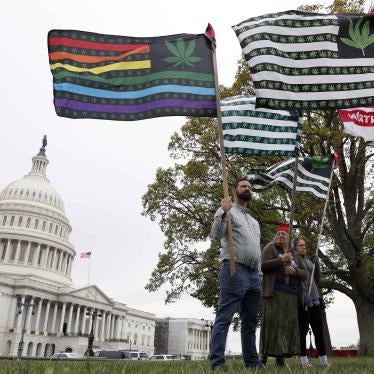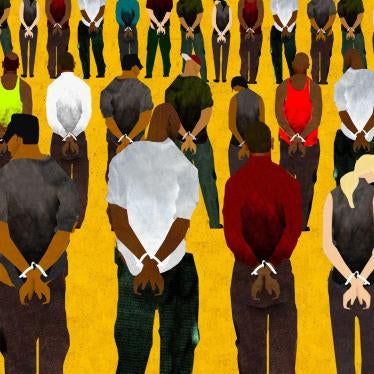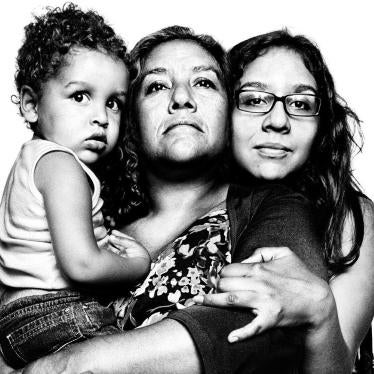The Honorable Nancy Pelosi
Speaker of the House of Representatives
1236 Longworth House Office Building
Washington, DC 20515
The Honorable Steny Hoyer
Majority Leader
H-107, The Capitol
Washington, DC 20515
The Honorable Kevin McCarthy
Minority Leader
2468 Rayburn House Office Building
Washington, DC 20515
Re: Co-sponsor the MORE Act (HR 3617) and Support Swift Passage in the House
Dear Speaker Pelosi, Majority Leader Hoyer, Minority Leader McCarthy, and Honorable Members of the US House of Representatives:
I write on behalf of Human Rights Watch to urge you to co-sponsor the Marijuana Opportunity Reinvestment and Expungement Act (MORE Act) and support its swift movement to the House floor for a vote this month. Last year, the bill introduced in the 116th Congress by House Judiciary Committee Chairman Representative Jerry Nadler was backed by 120 House co-sponsors and the House of Representatives passed the MORE Act with a 228-164 vote. The passage of the MORE Act represented a landmark step toward a rights-respecting criminal legal system while furthering racial justice and equity. Human Rights Watch again calls upon members of Congress to take the necessary steps to further racial justice by swiftly ending marijuana prohibition and repairing the harm it has caused.
The MORE Act removes marijuana from the Controlled Substances Act and begins to repair the harm marijuana prohibition has caused to millions of people, particularly Black and brown communities, by establishing a fund for social equity programs to reinvest in affected communities. It also would protect noncitizens from immigration consequences due to a cannabis-related event and creates a process by which people with federal marijuana convictions can have these convictions expunged or be resentenced.
Reduce the Role of Policing in and Ending Disproportionate Drug Arrests
In 2016, research by Human Rights Watch and the American Civil Liberties Union (ACLU) showed that in the US, someone was arrested for drug possession for personal use every 25 seconds, and half of those arrests were for marijuana possession.[1] Drug possession for personal use remains by far the offense for which people are arrested the most in the United States, with 1.35 million people arrested for drug possession in the United States in 2019.[2] The largest share of drug possession arrests is marijuana-related.
The racial disparities in these arrests remain acute.[3] Despite using drugs at similar rates as white people, Black adults are more than two-and-a-half times as likely as white adults to be arrested for simple possession. An April 2020 ACLU report found that in 2018, Black people were 3.64 times more likely to be arrested for marijuana possession than white people.[4] To fundamentally reform policing in the United States, Human Rights Watch calls on Congress to decriminalize the possession of all drugs for personal use and encourage state and local authorities to reduce the role of police in addressing societal problems including substance use disorder.[5]
Ending federal marijuana prohibition would not address criminalization of marijuana or other drugs at the state level, but would remove federal obstacles to state-level marijuana reform and send a powerful signal about the importance of pursuing it.
Protect the Rights of Immigrants and Prevent Family Separation
Marijuana criminalization has played a major role in tearing apart families. In a 2015 report, “A Price Too High: US Families Torn Apart by Deportations for Drug Offenses,” Human Rights Watch analyzed data received from Immigration and Customs Enforcement (ICE) in response to a request under the Freedom of Information Act.[6] Between 2007 and 2012 almost 266,000 deported immigrants had a drug conviction as their most serious conviction; of those, over 34,000 were for marijuana possession. Even lawful permanent residents can be deported for marijuana possession. People who use marijuana or work in the marijuana industry in a jurisdiction in which such activities are legal can face deportation for such activities or be barred from ever gaining legal status and citizenship. Due to federal prohibition, a conviction for simple possession of marijuana can trigger mandatory detention provisions—people who would never face jail time under criminal laws faced months or even years of detention under immigration laws. Many of the people Human Rights Watch interviewed had US citizen family, who also suffered the consequences of these harsh immigration laws. By ending the federal prohibition against marijuana, the MORE Act would end such draconian outcomes and help keep families together.
A Path to Repair and Redress for the Devastating Toll of Marijuana Prohibition
The MORE Act is a bill that will begin to repair harms, particularly in Black, brown, and immigrant communities, as a result of the war on drugs. The bill would direct federal excise tax on marijuana sales toward funding reinvestment in communities adversely impacted by drug prohibition[7] and build up programming to support a more equitable, diverse, and inclusive industry.[8]
For all these reasons, passing the MORE Act represents a real opportunity at the federal level to address racial justice and equity in the US policing and criminal legal system. Human Rights Watch urges you to co-sponsor the MORE Act and support its swift movement to the House floor in June.
Sincerely,
Laura Pitter
Deputy Director, US Program
Human Rights Watch
[1] Human Rights Watch, Every 25 Seconds: The Human Toll of Criminalizing Drug Use (New York: Human Rights Watch, 2016), https://www.hrw.org/report/2016/10/12/every-25-seconds/human-toll-criminalizing-drug-use-united-states.
[2] Common Sense for Drug Policy, “Total Annual Drug Arrests in The United States by Offense Type,” 2021, https://www.drugpolicyfacts.org/node/234 (accessed April 21, 2021).
[3] Thomas J. Rachko, Jr., “US Congress Should End Marijuana Prohibition,” commentary, Human Rights Watch Dispatch, August 25, 2020, https://www.hrw.org/news/2020/08/25/us-congress-should-end-marijuana-prohibition.
[4] American Civil Liberties Union, “A Tale of Two Countries: Racially Targeted Arrests in the Era of Marijuana,” April 16, 2020, https://www.aclu.org/press-releases/new-aclu-report-despite-marijuana-legalization-black-people-still-almost-four-times (accessed April 21, 2020).
[5] Human Rights Watch, A Roadmap for Re-imagining Public Safety in the United States: 14 Recommendations on Policing, Community Investment, and Accountability (New York: Human Rights Watch, 2020), https://www.hrw.org/news/2020/08/12/roadmap-re-imagining-public-safety-united-states.
[6] Human Rights Watch, A Price Too High: US Families Torn Apart by Deportations for Drug Offenses (New York: Human Rights Watch, 2015), https://www.hrw.org/report/2015/06/16/price-too-high/us-families-torn-apart-deportations-drug-offenses.
[7] “Marijuana Justice Coalition Asserts Statement of Principles on Federal Marijuana Reform,” Human Rights Watch news release, July 9, 2019, https://www.hrw.org/news/2019/07/09/marijuana-justice-coalition-asserts-statement-principles-federal-marijuana-reform.
[8] “US: Bill Seeks to End Federal Marijuana Prohibition,” Human Rights Watch news release, July 23, 2019, https://www.hrw.org/news/2019/07/23/us-bill-seeks-end-federal-marijuana-prohibition.







